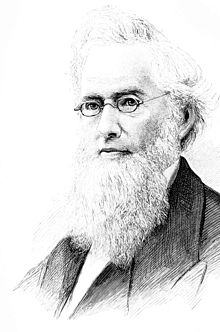Frederick Augustus Porter Barnard
| Frederick A. P. Barnard | |
|---|---|
 |
|
| 10th President of Columbia University | |
|
In office 1864–1889 |
|
| Preceded by | Charles King |
| Succeeded by | Seth Low |
| Personal details | |
| Born |
May 5, 1809 Sheffield, Massachusetts |
| Died | April 27, 1889 (aged 79) New York City, New York |
Frederick Augustus Porter Barnard (May 5, 1809 – April 27, 1889) was a deaf American scientist and educator.
Frederick Augustus Porter Barnard was born in Sheffield, Massachusetts, on May 5, 1809. In 1828 he graduated, second on the honour list, at Yale University, where he was a member of the Linonian Society. He was then in turn a tutor at Yale, and as he began to lose his hearing due to a hereditary condition he became a teacher (1831—1832) in the American Asylum for the Deaf and Dumb at Hartford, Connecticut, and a teacher (1832—1838) in the New York Institute for the Instruction of the Deaf and Dumb.
From 1838 to 1848 he was professor of mathematics and natural philosophy, and from 1848 to 1854 was professor of chemistry and natural history in the University of Alabama, also, filling the chair of English literature. In 1854 he was ordained as deacon in the Protestant Episcopal Church. In the same year he became professor of mathematics and natural philosophy in the University of Mississippi, of which institution he was chancellor from 1856 until the outbreak of the Civil War, when, his sympathies being with the North, he resigned and went to Washington.
In 1860, he was one of the party sent to Labrador to observe an eclipse of the sun; in 1862 he was at work on the reduction of Gilliss's observations of the stars of the southern hemisphere, and in 1863 he superintended the publication of maps and charts of the United States Coast Survey. He was elected an Associate Fellow of the American Academy of Arts and Sciences in 1860. He was president of the American Association for the Advancement of Science in 1866; a member of the board of experts of the American Bureau of Mines in 1865, and a member of the American Institute in 1872.
...
Wikipedia
